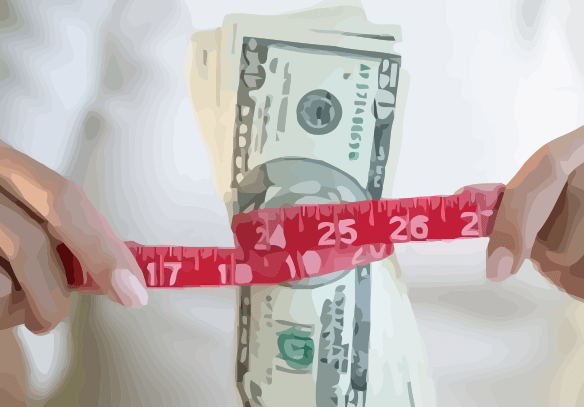The Great Shrinking Emergency Fund

There's near unanimity in the belief that you should have a cash emergency fund. The problem with that supposedly inviolate rule is that in low interest times like we're now in, your emergency fund gets smaller and smaller every day. I advocate alternatives to the large emergency fund thesis.
In times of low interest rates and high inflation, there's an awful effect for savers – negative real interest rates. Like a job where you never get a raise, negative real interst rates happen when your income (in this case from interest on your savings) declines after the effects of inflation. For a recent example, consider that in a typical ‘high-interest' savings account, you are offered 3%. With official CPI running at 4%, you're losing 1% of your emergency savings in real purchasing power terms. To make things worse, I haven't even included the effect of taxes on those interest payments. To make things much, much worse, I'm using the CPI put out by the federal government which many, including myself, think is a fiction. (I believe true inflation is much higher and if you've bought food, gas, health care, or day care recently, I think you'd agree. See Shadow Stats for more information.)
The bottom line is if you have a cash emergency fund, it gets smaller in real terms every day.
Fine, you say, but a 1% decline isn't so bad. And besides, what's the alternative? I think there are two decent alternatives to an ever-shrinking emergency fund – a fully-funded Roth IRA and ready credit.
Among the great features of a Roth IRA is its withdrawal rules. Without getting into all the various tax treatments for withdrawals before retirement, for our purposes you only need to know one thing. You can always get access to your initial investment. That is, if you fully fund a Roth IRA in 2008, you can always get at your $5,000 initial investment without tax or early withdrawal penalties.
With that in mind, I think a Roth IRA is a very good vehicle for emergency savings (beyond a small to medium size cash account for ‘mini-emergencie's like car repairs). You can invest the money with an eye toward growth (i.e. not in a passbook savings account) that should earn a higher return. But in a true emergency, you can still access the money. When the emergency passes, you can begin putting the money back into the Roth (for that year only).
The second alternative to a large emergency savings account is ready credit. Some people will recoil in horror at the thought of using credit in any form as an emergency fund. But I believe ready credit can make an excellent emergency backstop. I'd call any widely-accepted revolving credit line ‘ready credit.' Examples are unused credit card balances and HELOCs.
The great advantage to using ready credit as an emergency backstop is that it puts the interest rate risk onto the bank. They bear the 1% loss you'd incur if you saved as in my example above. (Mind you, the bank doesn't actually suffer a loss. They obviously invest that money into higher-than-inflation investment vehicles.)
The disadvantage to this technique, and it is admittedly a big one, is the possible sudden loss of those credit lines just when you need them. Recently, people have experienced a decreasing credit line on their credit cards. And in the event of a job loss, banks are known to pull or reduce HELOCs. I don't deny this is a problem. However, I would point out that not all emergencies involve the loss of a job (the most common reason for a loss of credit). Examples of situations where you'd want access to a good bit of money without having lost your job abound.
Do I think you should abandon a cash emergency fund? No. I just think, ideally, the 'emergency fund' should actually be a set of concentric rings around you. Closest to you is money kept for day-to-day expenses and any extra in a checking account. Beyond that is a smallish cash emergency fund. Beyond that is ready credit and/or saleable investments.
What do you think? What's your emergency fund technique?



Leave a Reply